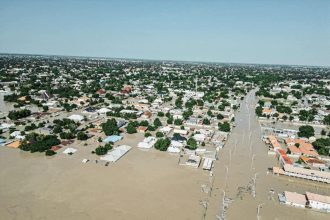
A federal judge in Maryland has blocked an executive order from President Donald Trump that sought to end birthright citizenship for children born to those who entered the United States illegally.
U.S. District Judge Deborah L. Boardman, a Biden appointee, issued a nationwide injunction on Wednesday on the executive order, expanding upon an earlier temporary injunction issued by a different court last month.
“The executive order conflicts with the plain language of the 14th Amendment, contradicts 125-year-old binding Supreme Court precedent and runs counter to our nation’s 250-year history of citizenship by birth,” Boardman wrote.
“The United States Supreme Court has resoundingly rejected the president’s interpretation of the citizenship clause of the 14th Amendment. In fact, no court in the country has ever endorsed the president’s interpretation. This court will not be the first.”
Shortly after being sworn in as president in January, Trump issued an executive order that sought to remove automatic citizenship to children born to undocumented immigrants in the U.S., with the order slated to take effect 30 days after it was signed.
Trump’s executive order stated that while the 14th Amendment says, “All persons born or naturalized in the United States, and subject to the jurisdiction thereof, are citizens of the United States and of the State wherein they reside,” it was never meant “to extend citizenship universally to everyone born within the United States.”
“The Fourteenth Amendment has always excluded from birthright citizenship persons who were born in the United States but not ‘subject to the jurisdiction thereof,'” reasoned the order.
The order barred the government from issuing “documents recognizing United States citizenship” for newborns whose “mother was unlawfully present in the United States and the person’s father was not a United States citizen or lawful permanent resident at the time of said person’s birth, or (2) when that person’s mother’s presence in the United States was lawful but temporary, and the person’s father was not a United States citizen or lawful permanent resident at the time of said person’s birth.”
Trump’s order quickly faced multiple lawsuits, including one filed by the American Civil Liberties Union and other progressive advocacy organizations.
U.S. District Judge John C. Coughenour, a Reagan appointee based in Seattle, ruled last month that the order was “blatantly unconstitutional” during a hearing on a lawsuit filed by four states — Washington, Arizona, Illinois and Oregon.
“This unconstitutional and un-American executive order will hopefully never take effect thanks to the actions states are taking on behalf of their residents,” said Washington State Attorney General Nick Brown, who initiated the lawsuit, in a statement.
“Birthright citizenship makes clear that citizenship cannot be conditioned on one’s race, ethnicity or where their parents came from. It’s the law of our nation, recognized by generations of jurists, lawmakers, and presidents, until President Trump’s illegal action. That’s why we’ve stepped in to protect Washingtonians from harm.”
In 1898, the U.S. Supreme Court ruled 6-2 in the case of United States v. Wong Kim Ark that an individual born in California was indeed a citizen of the United States, even though his parents were Chinese nationals.








